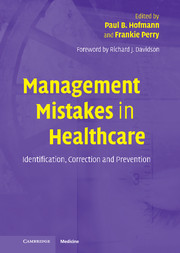Book contents
- Frontmatter
- Contents
- Notes on the contributors
- Foreword
- Preface
- Acknowledgments
- Part I Addressing management mistakes in healthcare
- 1 Acknowledging and examining management mistakes
- 2 The context of managerial mistakes
- 3 Identifying, classifying, and disclosing mistakes
- 4 What medical errors can tell us about management mistakes
- 5 Correcting and preventing management mistakes
- 6 A question of accountability
- Part II Case studies of mistakes in healthcare management
- Suggested further reading
- Index
- References
5 - Correcting and preventing management mistakes
Published online by Cambridge University Press: 12 October 2009
- Frontmatter
- Contents
- Notes on the contributors
- Foreword
- Preface
- Acknowledgments
- Part I Addressing management mistakes in healthcare
- 1 Acknowledging and examining management mistakes
- 2 The context of managerial mistakes
- 3 Identifying, classifying, and disclosing mistakes
- 4 What medical errors can tell us about management mistakes
- 5 Correcting and preventing management mistakes
- 6 A question of accountability
- Part II Case studies of mistakes in healthcare management
- Suggested further reading
- Index
- References
Summary
The purpose of this chapter is to provide the reader with an effective framework from which to address the inevitability of management mistakes. This approach is based on lessons learned from personal and career examples of management mistakes, and offers recommendations designed to correct, avoid, and minimize the impact of future management mistakes. During their careers, both authors have made management mistakes, observed mistakes, corrected mistakes, and prevented mistakes. Mistakes are unavoidable if managers are being appropriately decisive. The practice of management is not a perfect science but it has developed a body of knowledge for improving performance. Lessons learned from mistakes, coupled with skills learned in the practice of management, hold many opportunities for improved management performance. In what follows, we will in turn comment on the proposition raised at the beginning of each section.
Recommendations for correcting management mistakes
Celebrating and learning from our mistakes
“For every complex problem, there is a solution that is simple, neat, and wrong” (H. L. Mencken). If we are to be effective and aggressive managers we must be prepared to take risks, to make decisions, to make mistakes, and to learn from the experience. This is the essential quality of successful management.
John Russell
During my seven years as a member of the senior management team at the University of Wisconsin Medical Center, we naturally made mistakes and the hospital CEO, Edward Connors, developed a process to celebrate mistakes and learn from them.
- Type
- Chapter
- Information
- Management Mistakes in HealthcareIdentification, Correction, and Prevention, pp. 84 - 102Publisher: Cambridge University PressPrint publication year: 2004
References
- 1
- Cited by



